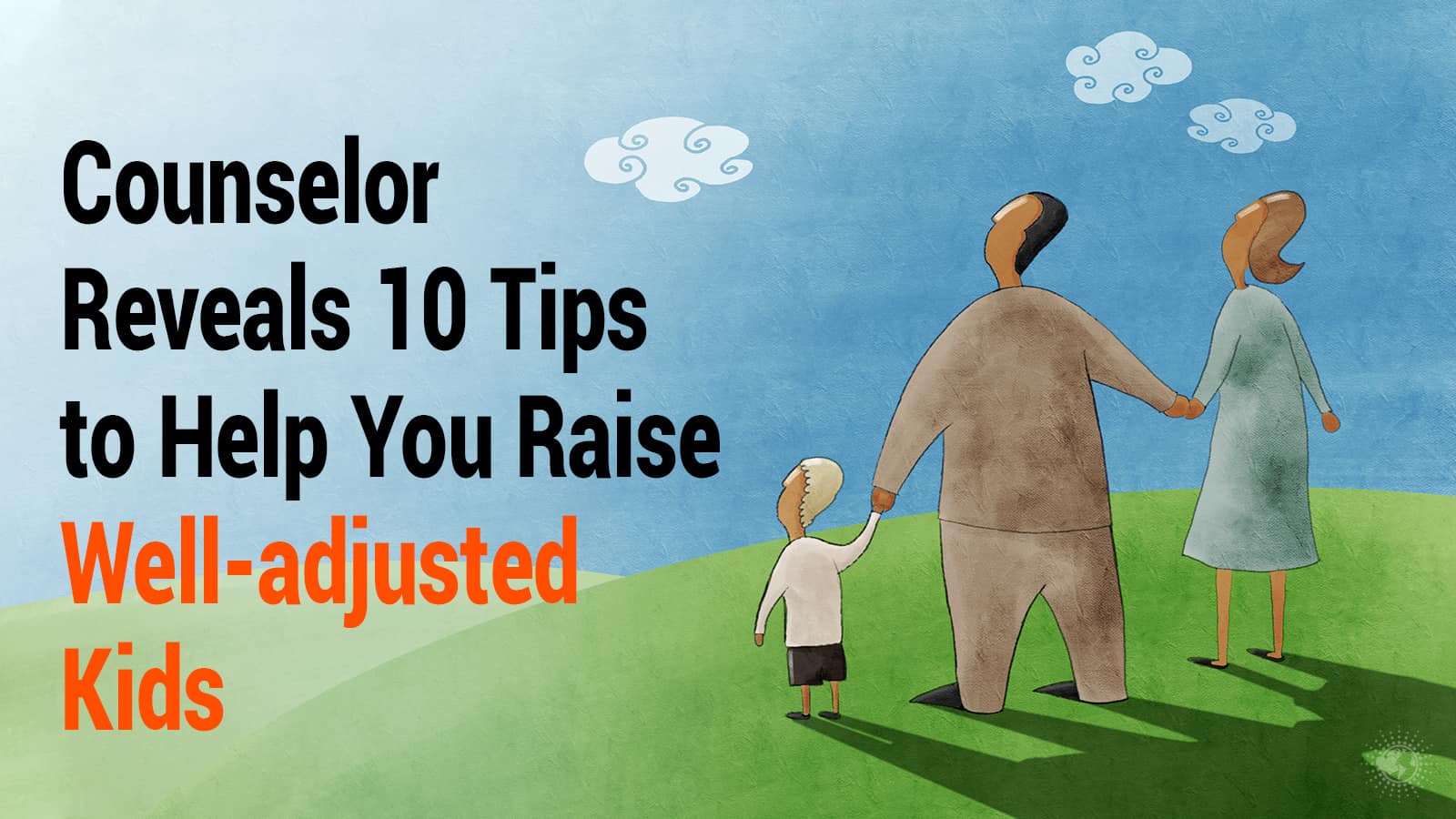Well-adjusted kids are able to control their emotions and deal with their problems without getting overly anxious. As a parent, you hope to raise kids who become well-adjusted adults. But why does this matter so much?
Children today live in a world that can be fast-paced and overwhelming. The rapid-fire pace of life can overwhelm. As a parent, you must equip your little one to not only survive–but to thrive.
10 Tips for Raising Well-adjusted Kids
Here are 10 counselors’ helpful tips to raise happy, well-adjusted children.
1 – Be a predictable parent
Predictable parenting gives a child a sense of stability. Studies found that unpredictable actions and attitudes from parents are unsettling for kids. Kids who are raised with parents who relate to their children in a peaceful, calm way promote a child’s ability to control their own emotions and actions. Create a low-stress routine for your children with predictable mealtimes, playtimes, and sleeping times. This allows your kids to understand what their day will be like and make them feel a sense of being in control. Of course, life has its unpredictable moments. That’s okay, as long as the majority of your days, weeks, and months follow a predictable routine.
2 – Be a good example to your kids
The old saying, “do as I say and not as I do” isn’t a good parenting philosophy. Your kids watch you all the time. They watch how you treat other people, handle your stress, and how you deal with your feelings. And your kids imitate your words and actions. Have you ever heard your child talk to a sibling or a friend in a bossy parental way? You cringed when you realized they sound just like you do when you correct them. Living as a good example for your kids is essential for raising well-adjusted kids. You can’t tell them one thing but do another thing. They’ll see your hypocrisy right away.
Examples of hypocrisy in parenting:
- If you tell your kids to be kind, but you gossip about people to your kids.
- You yell at your kids, but you tell them not to yell at their siblings.
- You tell your kids to be patient, but then you get angry at the restaurant when your food doesn’t arrive quickly enough.
- You tell your kids to serve others, but you always tell your neighbors you’re too busy to help them even when you’re not.
Your kids will catch on to your lack of integrity. They will feel it’s unfair when you correct them, but then you don’t live by the same rules.
3 – Teach your kids to respect your household rules
Every household has rules. Your kids need to understand the rules of your home and to respect them by obeying them. Kids need to know their boundaries. If you’re aren’t firm on the rules, they’ll feel like they can do whatever they want. Or if you’re too strict, they’ll feel like all you care about are the rules.
Explain your rules
Explain to your child why the rule exists. “In our house, everyone does chores because we all contribute.”
Praise when they obey
When your child attempts to do a chore, be sure to give them praise even if it’s not perfectly done. “I love the way you worked so hard to put away the dishes. Great job.”
You obey the rules
If the house rules are to clean up after yourself, be sure you do it. Don’t expect your kids to do things you don’t do.
Good conscience
If your child feels bad about not doing something that’s a sign they have a working conscience. That’s a good thing. Emphasize that although they did make a mistake, everybody makes mistakes.
4 – Discipline your children appropriately
Discipline helps your child learn to better fit into the world. Positive and effective discipline teaches kids to obey without force. When you discipline your child, you’re telling them what unacceptable behavior looks like in a loving, firm way.
Studies on raising happy children found that discipline is one of the most important roles for parents. It requires lots of time and energy. There are no shortcuts when it comes to being a parent. What parent hasn’t had to stop what they were doing to discipline your child? It’s frustrating, exhausting, and overwhelming. But parenting reaps wonderful rewards.
When you discipline your child, be firm, but kind. If you tell your child they need a time out, stand by your decision, don’t waffle when they cry or plead. Effective discipline helps your kids learn self-control and self-discipline as they grow. Be sure you maintain a good bond with your kids, they should feel your respect. Never call them names or belittle them. No shouting, yelling or lashing out at them. This will erode their trust in you.
5 – Teach your kids to be selfless when dealing with other people
Kids aren’t born thinking about others. Everyone has heard a little kid yell, “Mine!” instead of sharing their toys. Unselfishness and being others’ oriented needs to be taught. Encourage your kids to help others, to share, and to have empathy for others. Plan opportunities for your family to help in your community homeless shelter or soup kitchen or participate in a community clean up.
6 – Teach your kids problem-solving skills
Your kids need to learn how to solve their problems. Your three-year-old son may need to learn to have self-control by not screaming when his big brother wants to play with his toy, but your thirteen-year-old daughter may need to learn how to compromise during an argument with her best friend. Here are three strategies to help your kids learn how to solve their own problems.
Give your child choices
Let your younger kids choose clothing, food, or what activities they want to do. Give them a choice of ‘this or that’ rather than open-ended choices.
As they learn how to make small decisions, then you can begin to give them choices in problem-solving situations. When your younger daughter is screaming at her little brother, ask her, “What would be a better way to solve this instead of screaming at your brother grabbed your toy?”
Teach them to not give up
Encourage them to work hard to solve their problems whether it’s how to clean up their toys or put away their clean clothes.
Let them think
When your child asks you a question about how to do something, don’t just tell them, ask them what they would do. This forces them to think about how to solve problems.
7 – Teach your children to be kindhearted
Praise your kids when they show kindness to people or animals. Encourage their efforts even if they aren’t received well or aren’t well thought out. Give them pointers on what kindness looks like. Be a good model for your kids of being kind to those around you.
8 – Teach your kids gratitude
Teach your child to say thank you and show gratitude to adults or other kids. Encourage them to look for the good even in difficult situations in their life. Congratulate your child when they express gratitude. Make it a regular conversation to point out what you’re grateful. Ask them what they’re thankful for.
9 – Teach your kids good health habits
Teach your kids the value of being healthy. Eating good foods, exercise, and taking care of your body are important things for a parent to teach their kids. Set an example at home by serving healthy meals and doing family outside activities like hiking, going to the beach or to the park. Stay active with your kids in the backyard playing soccer or basketball.
10 – Teach your kids how to express their emotions
As a parent, you understand we need to feed, clothe, and educate your children. That’s the easy stuff. The more difficult thing you’ll face is training your kids to express themselves. Kids are a bundle of emotions. They express themselves through crying, angry outbursts, or fear.
It’s difficult to untangle what’s really going on when your three- year son suddenly refuses to go to bed at night because of the dark. But as hard as it is, it’s critically important that you stay engaged with your kids in spite of their messy emotions.
Being a lax parent can cause emotional and mental harm to your child. Don’t try to address every emotional outburst, pick one, and work with your child on it. Teach them better ways to communicate. Give them some simple instructions on how to express their emotions such as, “I’m sad about….” or “I don’t like it when..” or “I get afraid when…”
Final Thoughts on Raising Well-adjusted Kids in a Fast-Paced World
Parenting well-adjusted kids take thoughtful engagement on your part. Staying consistent in your words and actions is extremely important for raising happy kids. When you live out what you ask their kids to do, they’ll follow your example. So hang in their parents. Stay strong and keep working to help your kids become happy, well-adjusted adults.






